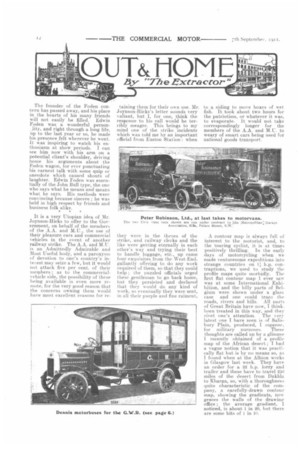The founder of the Foden concern has passed away, and
Page 12

If you've noticed an error in this article please click here to report it so we can fix it.
his place in the hearts of his many friends will not easily be filled. Edwin Foden was a wonderful personjay, and right through a long life, up to the last year or so, he made his presence felt wherever he went. It was inspiring to watch his enthusiasm at show periods. I can see him now with his arm on a potential client's shoulder, driving home his arguments about the Foden wagon, for ever punctuating his earnest talk with some quip or anecdote which caused shouts of laughter. Edwin Foden was essentially of the John Bull type, the one who says what he means and means what he says. His methods were convincing because sincere ; he was held in high respect by friends and business folk alike.
It is a very Utopian idea of Mr. Joynson-Hicks to offer to the Government, on behalf of the members of the A.A. and MX., the use of their pleasure cars and commercial vehicles in the event of another railway strike. The A.A. and M.U. is an Admittedly Admirable and Most Useful body, and a paroxysm of devotion to one's country's interest may seize a few, but it would not attack five per cent. of their members ; as to the commercialvehicle side, the possibility of these being available is even more remote, for the very good reason that the concerns owning them would have most excellent reasons for re
taining them for their own use. Mr. Joynson-Hicks's letter sounds very valiant, but I, for one, think the response to his call would be terribly meagre. This brings to my mind one of the strike incidents which was told me by an important official from Euston Station : when they were in the throes of the strike, and railway clerks and the like were getting eternally in each other's way and trying their best to handle luggage, etc., up came four exquisites from the \Vest-End, gallantly offering to do any work required of them, so that they could help .; the puzzled officials urged these gentleman to go back home, but they persisted and declared that they would do any kind of work, so eventually they were sent, in all their purple and fine raiment, to a siding to move boxes of wet fish. It took about two hours for the patriotism, or whatever it was, to evaporate. It would not take correspondingly longer for the members of the A.A. and M.U. to weary of smart cars being used for national goods transport.
A contour map is always full of interest to the motorist, and, to the touring cyclist, it is at times positively thrilling. In the early days of motorcycling when we made venturesome expeditions into strange countries on I.', li.p. contraptions, we used to study the profile maps quite morbidly. The first flat contour map I ever saw was at some International Exhibition, and the hilly parts of Belgium were shown under a glass case and one could trace the roads, rivers and hills. All parts of Great Britain have now, I thin. been treated in this way, and they rivet one's attention. The very latest one I have seen is of Salisbury Plain, produced, I suppose, for military nurnoses. These thoughts are called up by a glimpse I recently obtained of a profile map of the African desert ; I had a vague notion that it was practically flat but is by no means so, as I found when at the Albion works in Glasgow last week. They have an order for a 32 h.p. lorry and trailer and these have to travel 250 miles of the desert from Dakhla to Kharga, so, with a thoroughness quite characteristic of the company, a carefully-drawn contour map, showing the gradients, now graces the walls of the drawing office ; the average gradient, I noticed, is about 1 in 20, but there are some bits of I in 10.




















